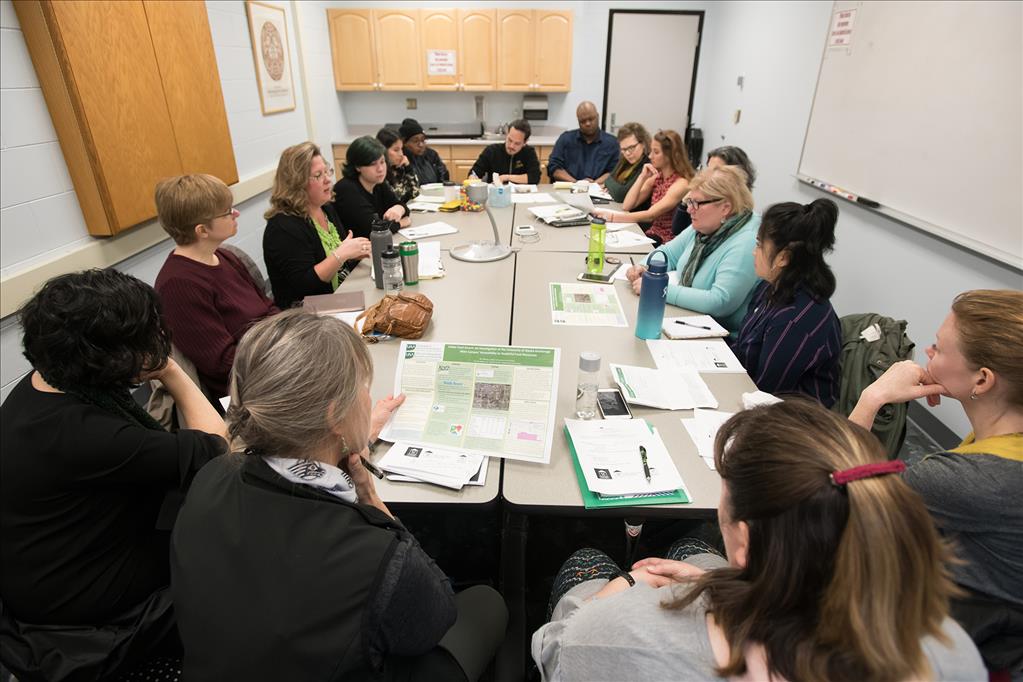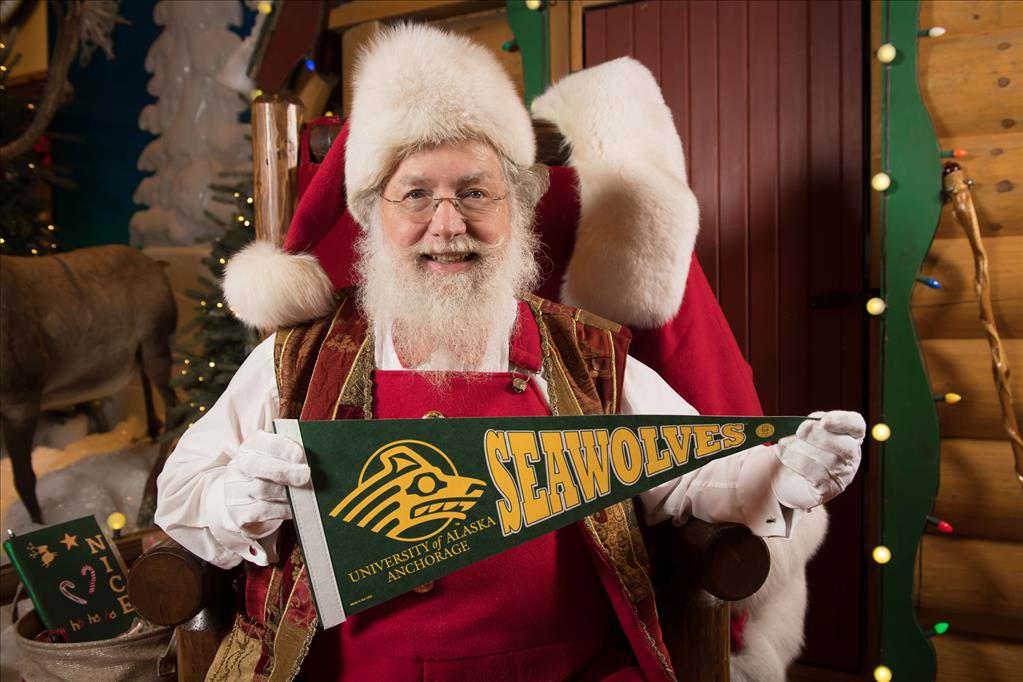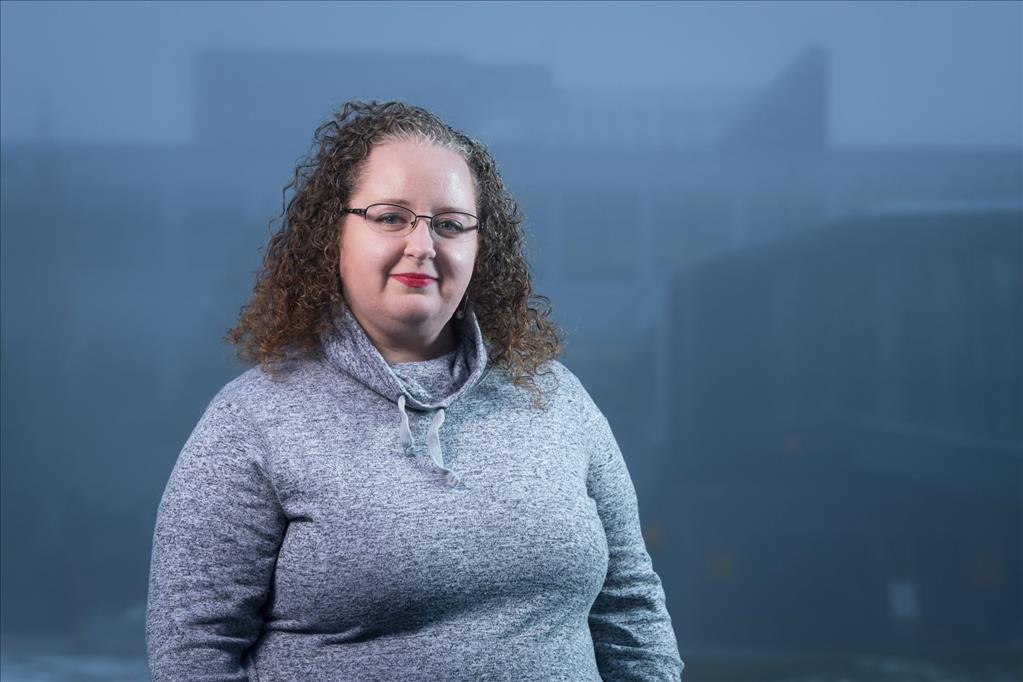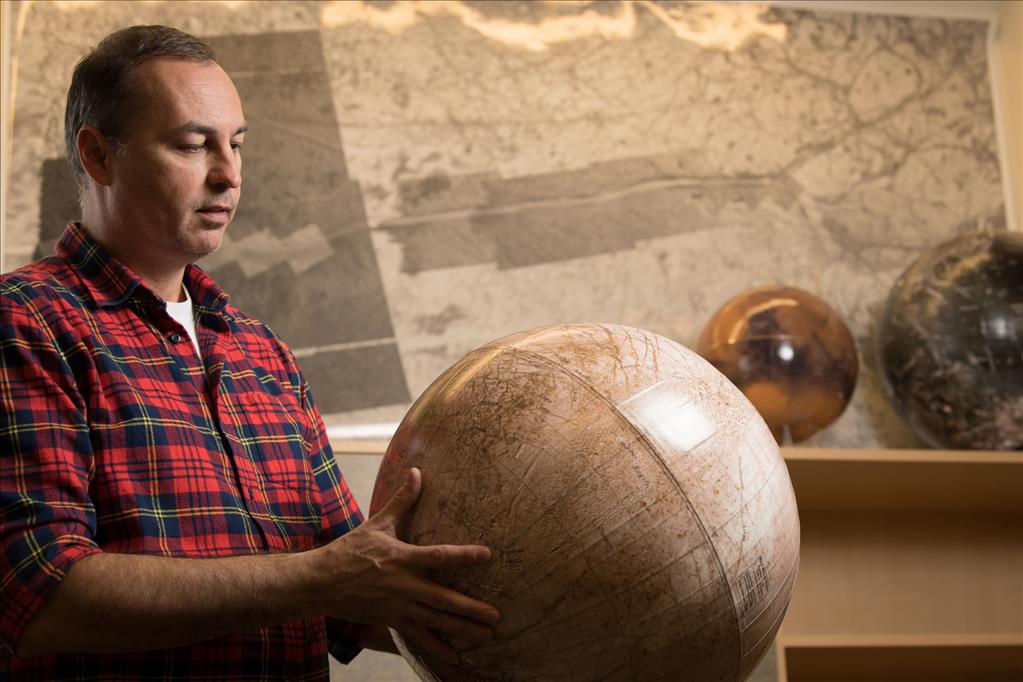UAA’s first global entrepreneur in residence helps fill the gaps in Alaska’s startup ecosystem
by Matt Jardin |
Becoming an entrepreneur requires courage. So does moving to a new country. Where the two intersect is where you'll find Nigel Sharp, UAA's first global entrepreneur in residence (GEIR).
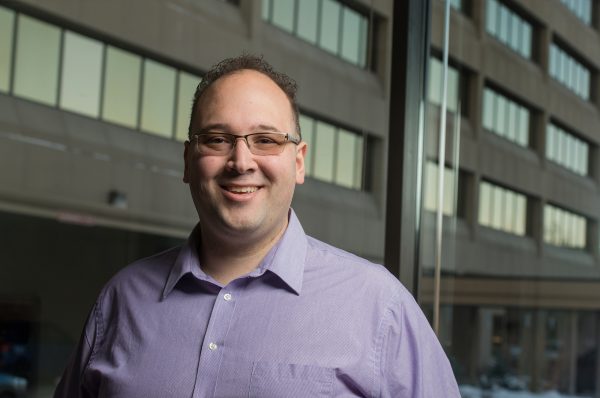
British-Armenian Nigel Sharp is UAA's first global entrepreneur in residence. In this capacity, Sharp serves as a mentor and consultant to UA students, staff and faculty while also searching for opportunities to help develop the entrepreneurial ecosystem in Alaska as a whole. (Photo by James Evans / University of Alaska Anchorage)
Brought onboard in June 2017, Sharp serves as a mentor and consultant to University of Alaska students, staff and faculty while also searching for opportunities to help develop the entrepreneurial ecosystem in Alaska as a whole. His position is similar to other GEIR programs which partner entrepreneurs from foreign countries with universities across the U.S.
Earlier GEIR programs sought to pair international entrepreneurs with universities in cities with established startup communities, such as Boston, Chicago, New York City and Silicon Valley. However, there has been a growing interest to adopt the GEIR template in areas where the startup scene is just getting off the ground.
Alaska is considered to be one of these emerging startup communities, so it made sense for UAA to hire its own GEIR. Sharp's position is housed in the university's Business Enterprise Institute (BEI), which serves as a bridge connecting UAA to the wider Alaska business community.
"It seems like a lot of the emerging ecosystems are mountain towns," Sharp notices. "They're a little smaller and have close-knit communities. I think it's because there's a movement toward looking for better quality of work-life balance. A lot of that is access to outdoor recreational opportunities."
While the GEIR position may be new to UAA, it's a role Sharp feels at home in, having served in the same capacity at the University of Colorado Boulder (CU Boulder) from 2015 to 2017. During his tenure, Sharp co-founded software networking firm Stateless Inc., and worked to attract investors and secure funding to spin out of CU Boulder and become a fully independent company.
[embed]https://www.youtube.com/watch?v=9qnB55Swqp8&feature=youtu.be[/embed]
Sharp feels comfortable providing guidance to startups because he's done much of it before. When he was a teenager, the British-born Sharp established a company that sold a computer mouse cleaner, which he also invented himself.
More recently, Sharp co-founded and was CEO of Lionsharp, a technology company that produced Voiceboard, a gesture- and voice-controlled presentation software, which he describes as "PowerPoint on steroids." At its peak, Lionsharp had offices in Boston, Bulgaria and Armenia, where the company was founded after attracting U.S. and Bulgarian investors after showcasing at the global Microsoft Imagine Cup event.
Lionsharp also participated in a Global Accelerator Network program where Sharp was serendipitously connected to Brad Feld, a Colorado-based venture capitalist with strong ties to Alaska's angel investor community, and co-founder of Techstars, a global network of business accelerators supporting seed stage startups. It was also Feld who reached out to Sharp about traveling to Boulder to participate in CU Boulder's burgeoning GEIR program.
GEIR goals and responsibilities often differ depending on the entrepreneurial landscape of the city in which the position is located. In Boulder, where there are a higher number of investors, startup events and business incubators, Sharp's GEIR duties leaned more toward individual idea development. In Alaska, Sharp's GEIR position is more concerned with wider ecosystem development.
In a way, Sharp has been preparing for this expanded focus since his time in Boulder.
"I was really inspired by Brad Feld and other folks who promote the principal of give first. Give first is the idea that if you can go into a startup community and give without any expectation of getting something directly in return, that we build more cohesive and supportive entrepreneurial ecosystems because entrepreneurship is impossible alone," Sharp explains. "I find it hugely rewarding to be in this role where I can be of service to others and act in a mentor capacity because the mentor-mentee relationship is two-way and I've gotten as much value out of it as others have taken from me."
When Sharp arrived in Anchorage, one of his first tasks was to get the lay of the land and generate a gap analysis. He took the project a step further and produced an innovation directory, compiling 95 organizations, events, platforms and opportunities Sharp found in Alaska that centered around entrepreneurship into one convenient and valuable resource.
"The impression I had been given was that Alaska's entrepreneurial ecosystem was very nascent, but I was surprised by how much was going on when I arrived," he admits. "There were established opportunities that have been around for years, but there were a few missing gaps."
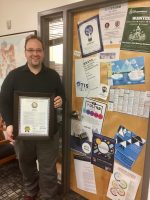
Sharp poses in front of his office door, adorned with posters from the many entrepreneurial events around Alaska he was able to help organize. (Photo by Matt Jardin / University of Alaska Anchorage)
Two gaps that have seen the most improvement during Sharp's time here are embracing innovation sprints, and growing Alaska's entrepreneurial ecosystem beyond Anchorage. Sharp has worked to fill these gaps by organizing events around the state, including the first startup weekend in Juneau, an economic brainstorming session in Bethel, an entrepreneurship seminar in Soldotna and a lean development workshop in Fairbanks, just to name a few.
Other gaps Sharp has observed include raising mid-level capital, keeping industries in Alaska and pipelining talent to startups. "There are gaps around Series A funding. So if you're trying to raise $3-to-10 million in Alaska, it's not that straightforward. There's actually established funds above that and below that, but there's not much in the middle. Another gap is that we don't have a great pipeline for talent into startups, especially connecting students into startups. Also, how do we keep companies here and is there enough talent and depth for certain fields to grow?"
Tackling these issues would be a tall order for anyone, even more so for Sharp given that December marks the end of his planned 18-month tenure as UAA's GEIR. BEI is inclined to agree, and has extended Sharp's contract into 2019.
"Alaska's entrepreneurial landscape certainly has a lot of unique opportunities and challenges," says Christi Bell, UAA associate vice provost and BEI executive director. "It's been refreshing working with Nigel and applying his international experience to those very Alaskan challenges. With his extended involvement, I'm excited to see how our community of entrepreneurs and overall entrepreneurial ecosystem will continue to evolve."
With some of the external gaps addressed, Sharp is looking to use his added time to direct his efforts inward, similar to how he was operating in Boulder.
"We have programs spinning out of UAA, UAF and UAS that drive conversations around innovation methodologies and entrepreneurial spirit, but it's still fairly nascent. I'd like to put more energy into creating a talent pipeline from the university," he shares. "We're here to train the next generation of the Alaskan workforce. That doesn't necessarily mean leaving the university and starting their own company, but potentially working with newer companies that are now being formed here in the state."
[embed]https://www.youtube.com/watch?v=JH0jMANRL2E&feature=youtu.be[/embed]
Even though some of the gaps he identified seem insurmountable, Sharp reassures that it's still a really exciting time to enter Alaska's entrepreneurial ecosystem. Many of said gaps are being addressed by driven local leaders, and Sharp has noticed some interesting forays into industries he wasn't expecting to find in Alaska, including renewable energy, health care, drones and the ocean economy.
Sharp notes that this growth is also happening during an economic recession in Anchorage, which is a sentiment echoed by the Anchorage Economic Development Corporation's three-year Outlook Report released earlier this year.
"Part of it is things have to get a little harder. Sometimes recessions actually drive growth and innovation," says Sharp. "Right now we're moving into a phase as a community that's become more entrepreneurially led and we need more entrepreneurs to embrace the journey. You're catching it at a really exciting time, and I've been lucky to be here at this inflection point."
Sharp will next serve as a mentor and judge at Startup Weekend Anchorage 2018 running Friday, Nov. 9 to Sunday, Nov. 11.
Written by Matt Jardin, UAA Office of University Advancement
 "UAA’s first global entrepreneur in residence helps fill the gaps in Alaska’s startup
ecosystem" is licensed under a Creative Commons Attribution-NonCommercial 4.0 International License.
"UAA’s first global entrepreneur in residence helps fill the gaps in Alaska’s startup
ecosystem" is licensed under a Creative Commons Attribution-NonCommercial 4.0 International License.










